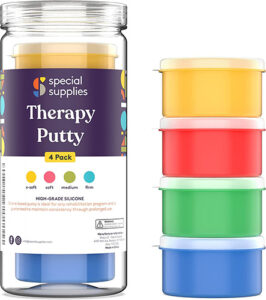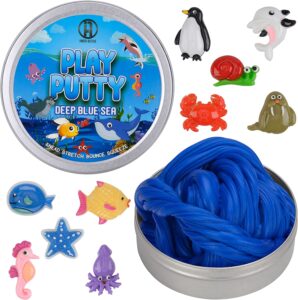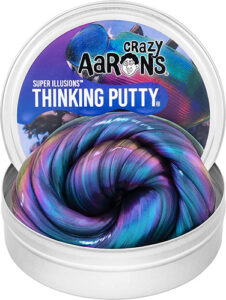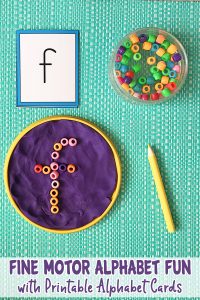10 Things To Do with Silly Putty…Even When You Don’t Like the Feel of It!
Have you ever played with silly putty? Or theraputty or bouncing putty? Putty is a great tool for building hand strength and fine motor skills, and today we’re sharing ten things to do with silly putty, including ideas that work with children who don’t like the feel of it!
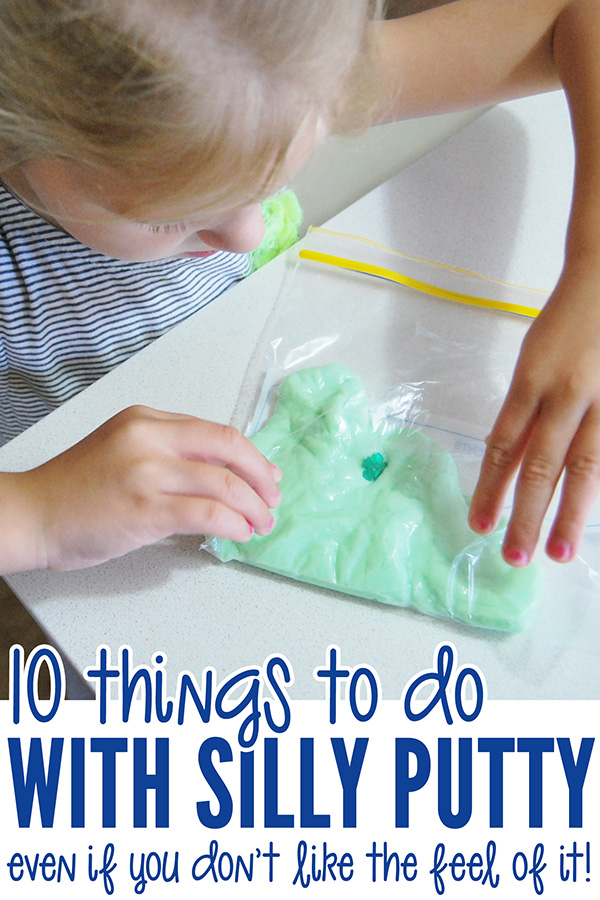
What is putty and why is it so fabulous?
Putty is a silicone based product that is often used for hand therapy activities. It is portable and inexpensive, and also relatively mess free. Playing with putty can help to build hand and finger strength, co-ordination and fine motor skills, and my girls find it kind of addictive to manipulate and play with.
You can make your own with our DIY Silly Putty Recipe or try one of these great putty picks (these are Amazon links);
10 Things to Do With Silly Putty
But how do you play with putty? You can find 14 fabulous ideas to get your started in our other putty post, Silly Putty & Therapy Putty Activities and Exercises, and below you’ll find a bonus ten activity ideas! These have the added bonus of being ideas that work for children who don’t like the squishy texture of silly putty on their skin. How? By placing the putty in a ziplock bag!
But they also provide a great learning and hand strengthening challenge for those who don’t mind touching it.
But how do you play with silly putty in a bag? We use ‘in the bag’ activities often as they provide all of the benefits of sensory play and strength/fine motor skill building whilst also being portable and mess free (important when you are doing therapy and play out and about!) Plus they are great for those who don’t mind touching. And a few can be easily adapted to play without the bag too!
Here are 10 things to do with silly putty activity suggestions;
1. Smoothing:
Use a permanent marker to draw a large shape on one side of the bag, then flip it over and let your child manipulate the putty inside the bag to fill the outline and create the shape.
To do this without the bag, use a laminated shape card or place the card inside a ziplock bag and the putty outside.
2. Treasure hunt
Hide mini objects (particular sequins or buttons) or small foam letters inside the putty and create matching cards to go with them (I usually just draw pictures on squares of paper). Turn the picture cards over face down and then flip them one by one, your child needs to find the same object or letter inside the slime. Sometimes we use a timer and if it hasn’t been found in time the card gets turned back over.
3. Make it sparkle!
Fill a bag with slime and then pour glitter or small sequins on top before sealing. Let your child work the glitter through the putty by manipulating the putty inside the bag.
4. Color Mixing
Put two different colors of slime inside the bag (for example, blue and yellow) and let your child combine the colors together to create a new color. This one can obviously be a fun challenge without the bag too.
5. Spell it!
Use a cotton bud to ‘write’ sight words or spelling words in the putty through the bag.
6. Bullseye!
Put a single large sequin inside the bag and draw a circle in the middle of the outside of the bag. Your child need to move the sequin around and through the putty in the bag until it is inside the circle. If the sequin is too difficult, try a small bead.
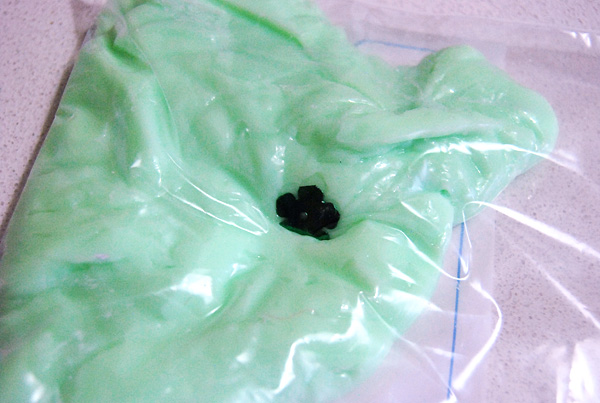
7. Make a Maze
Use a marker to draw a maze on the side of the bag and put a bead or sequin inside the putty. Your child can use their fingers to push the bead/sequin through the maze, from start to finish.
8. Make a Face
Put two plastic googly eyes, a bead and a moon shaped sequin and draw a face shape on the side of the bag with a marker. Children can manipulate the parts inside the bag to create a complete face with eyes, a nose and a mouth.
9. String It Up
Put a length of wool or string inside the slime and use a cotton swab to move it around to create the shape of a letter or number. Use a letter or number template underneath the bag as a guide if needed.
10. Hidden Pictures
Place a picture or sight word on a small piece of paper underneath the ziplock bag of putty. Invite your child to find a way to move the putty within the bag enough to figure out what the word or picture is. You can add a time limit with a kitchen timer for some extra challenge.
Written by Carrie of A Little Learning for Two.
Please note: I am not an occupational therapist, just a parent. These are activities we do in our own home, not part of a recommended therapy schedule or sensory diet.

